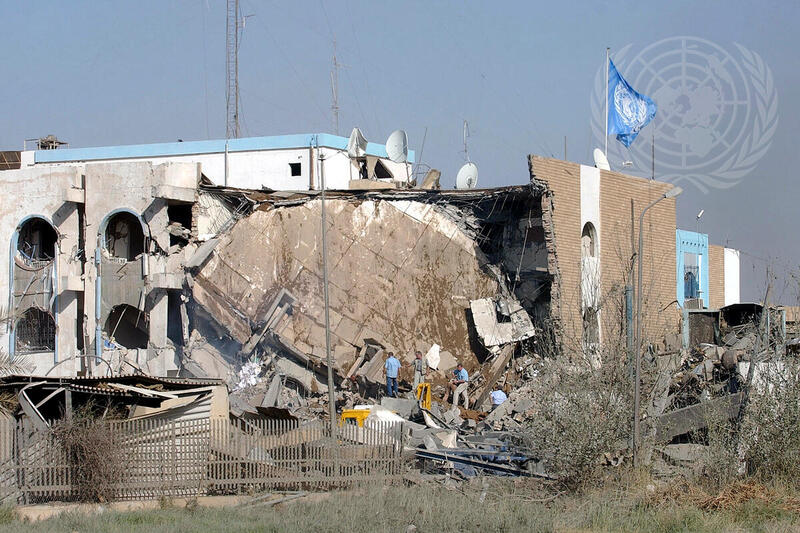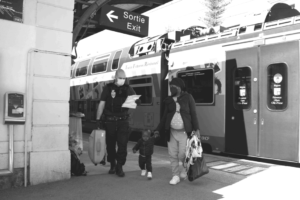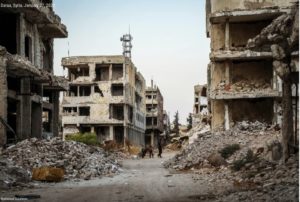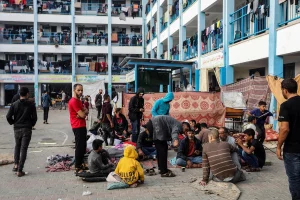This is a slightly edited version (for clarity and flow) of an interview that was conducted by UNOCHA with Khaled Mansour, a survivor of the 2003 terror attack against the UN headquarters in Baghdad, as part of OCHA commemoration of the 20th anniversary of this tragedy that killed 22 people and injured many. The initial version was posted here.
How were you, as an aid worker, affected by the Canal Hotel attack? Did it make you rethink what you did or where you worked?
The terror attack against the UN headquarters in Baghdad devastated me on the one hand, but it also radically reconfigured the way I think of my life and of the humanitarian aid enterprise.
I was in my car, heading back to the office, and just a few hundred metres away from the building when it was bombed and quickly collapsed. I was not physically harmed, but the psychological injuries were immense. Colleagues whom I worked with only a few hours earlier were either pulverized, or the remains of their bodies lay under sheets in the parking lot. I am still sometimes haunted by the blood and body parts I touched as I groped my way along darkened corridors shrouded in dust. I spent the rest of the afternoon and the evening driving with an Iraqi colleague around Baghdad to check on the wounded, put them in touch with their families and to comfort them.
I was very angry at the UN, at the stupid, murderous terrorists, and probably ultimately at myself for having survived while 22 others did not. This is what I found out through months and years of psychotherapy and self-reflection. Looking back at what happened, I still feel sad and angry at the huge loss of lives and potential but I have also learned a great deal. I was able to go back to work in armed conflict settings and think more critically of why the attack in Baghdad happened and whether it could have been avoided.
Twenty years later, what does the attack mean to you and your work?
After taking several months off, mourning this huge loss, I slowly went back to work. Two years later I even served as the UN Spokesperson in Beirut, during the Israeli 33-day bombardment of Lebanon in 2006. This does not mean I returned to what I was on the morning of 19 August 2003, before the attack took place. I like to think that I have become a more sensitive and considerate person, also more reflective about the limitations of humanitarian work and the need for massive reforms in the international system of governance, at least for the humanitarian enterprise.
I thought a lot about the politicization of humanitarian action to the extent that, 10 years later, I developed a graduate course on this issue and taught it at the Department of Law at the American University in Cairo. This politicization got more institutionalized in Afghanistan in 2001 and moved to deeper levels of integration in 2002 in the months of preparation for the war on Iraq. This has not changed, as we have seen in Syria, Yemen, Afghanistan, Israel-Palestine, Myanmar, Sri Lanka, Sudan and other catastrophes over the past 20 years. It should have been no surprise to see public opinion in the Middle East and South Asia turning against the UN and other aid agencies, which stood accused of having become a partial tool of the West
None of this is to excuse, much less justify, a vicious strategy by armed state or non-state groups involved in acts of terror. It is to try to understand the environment in which these groups recruit and operate. It is also to show the negative impact on the innocent people who are crushed between the political machinations of the international community on the one hand, and the armed groups (or States), which control their lives, on the other hand.
What does the attack and the UN’s response convey to the world today?
Aid workers are not mere idealists, and many of them understand how politicized their work and how instrumentalized their own lives have become. Still, many of the most realist among them find their position in various conflict areas untenable.
There is an urgent need to give meaningful effect to humanitarian principles through practical measures to transform funding mechanisms and governance systems, and to work for more transparency in the aid industry. We need to save this noble mission from becoming just a … [ceremonial] tool … because failing this, this tool will soon become useless, and the deaths of aid workers in Baghdad, and elsewhere, will amount to nothing more than collateral damage.
We need to unshackle aid workers and aid agencies. This would truly honour the memory of our fallen colleagues, instead of all the ceremonies that will take place around the world to commemorate the passing of 20 years since the Canal Hotel carnage.
Khaled Mansour is a writer and communication expert with many years of experience at the United Nations and as a journalist. He has worked and written on cultural, political, human rights, and humanitarian aid issues in addition to his fiction work. He worked for years in conflict and transitional situations such as in South Africa, Afghanistan, Iraq, Lebanon, and the Sudan in addition at the UN headquarters in New York. He was the Executive Director of Egypt’s leading human rights organization, EIPR (2013-2014). He published seven books, mostly in Arabic. His debut novel, “A Minefield” and his memoirs on Afghanistan, “From Taliban to Taliban” appeared in Arabic in early 2022. He keeps a blog at khaledmansour.org.
He is a member of UAI since its inception and a former member of UAI’s Executive Committee.













